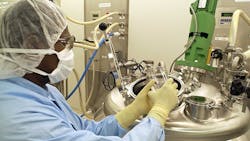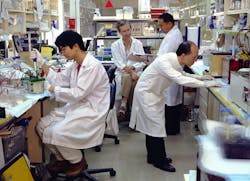Why is Singapore's Biomedical Business so Brisk?
IndustryWeek asked Kevin Lai, executive director, Biomedical Sciences and Consumer Businesses at the Singapore Economic Development Board about the underlying reasons for the growth of the life sciences industry in Singapore.
Q: What type of growth have you seen in this sector in the past two years?
A: In 2013, while the global biopharmaceutical industry continued to face pricing pressure, the sector in Singapore performed relatively well. The biopharmaceutical sector employed over 16,000 people.
"> ,>Q: which>Which companies opened up facilities or expanded current ones in 2014?
A: This year we announced a number of projects including the following:
AbbVie --The company announced it will build its first manufacturing plant since its split from Abbot Laboratories in 2012. It will invest $320 in the Singapore plant which comes online in 2019.">
Actavis -- The company announced a new regional office in Singapore that will serve as the headquarters for the company's Asia Pacific and Africa region.
Amgen -- The company inaugurated a new S$200 million biomanufacturing facility in Tuas Biomedical Park, marking the company's first manufacturing site in Asia.
Baxter International Inc. -- The company opened its first advanced recombinant biologic production facility in Singapore, including an investment in a new multi-product recombinant protein manufacturing suite.
Becton, Dickinson and Company (BD) -- The medical technology company unveiled a new annex building, which is an extension of its plant in Tuas Biomedical Park. The facility will house various functions across the product development cycle, including research and development, process design and manufacturing.
Hill-Rom -- The medical technology company opened its expanded Asia-Pacific Innovation Centre in Singapore. The new 24,000-square foot center now houses research facilities such as the Respiratory Care Development Centre and the Patient Support Development Centre.
Essilor International S.A. -- The French pharmaceutical company opened a new facility in Singapore to house its expanded headquarters for the AMERA (Asia, Middle East, Russia and Africa) region. The state-of-the-art facility also houses the group’s Centre for Innovation and Technology and the International Vision Academy.
Mesoblast -- The Melbourne-based company said it will establish its global cell therapy manufacturing and research and development hub in Singapore.
Mundipharma -- The global specialty pharmaceutical company expanded its regional office in Singapore.
PRIME Biologics -- The Singapore-based biotech firm opened a new plasma fractionation facility in Singapore, which is the first of its kind in Southeast Asia. The new plant will manufacture emergency drugs.
Plans for Future
Q: What type of future growth do you predict?
A: A recent Economist Intelligence Unit report stated that firms are expecting growth of 15% per year in the Asian biopharmaceutical markets over the next five to ten years. According to the report, global biopharmaceutical firms will be increasing their presence in the region in order to tap the growing market, lower their production costs, and improve the efficiency of their R&D processes. We are also bullish about the growth in this sector.
In the near term, we expect the biopharmaceutical industry in Singapore to be exposed to pricing adjustments by large markets such as the U.S. and Europe. In the medium and long term, biomedical output is expected to increase. The slew of biologics projects under construction currently is expected to boost output when the plants enter commercial production. In addition, existing facilities are constantly introducing new and higher value added products that will be manufactured in Singapore.
In the long term, there continues to be an increasing demand for effective medicines, amidst the expanding affluent and aging populations in Asia. Against this backdrop, companies remain confident about the long term growth potential of Asia and will gear up to access the expanding market opportunities in this region.
This growing interest in Asia will translate to more manufacturing investments and an optimistic medium- term outlook for Singapore’s biopharmaceutical manufacturing output.
In anticipation of these changes and to ensure the long term growth of biopharmaceutical sector in Singapore, the economic development board had been working proactively with companies to establish more flexible plants and new product introduction capabilities.
We have also started to develop a strong base of biologics manufacturing as a means to diversify the biopharmaceutical manufacturing sector in Singapore. Amgen and Novartis are constructing two new plants in Singapore which will be ready in 3-4 years.
Amgen’s new S$200 million biomanufacturing facility would also be the company's first manufacturing site in Asia. While it is 75% smaller than a conventional biologics facility and uses 80% less water and energy, the next- generation facility can manufacture the same quantity of products. The facility, which took only 15 months to build and a quarter of the capital cost to construct, will also need only a third of the operating expenses of a conventional facility. In the long run, these moves will make Singapore’s biopharmaceutical industry more competitive, sustainable and resilient.
In addition, Singapore’s medical technology industry has done well and is a thriving sector. The industry has more than tripled its manufacturing output from S$1.5 billion to S$5 billion since year 2000. Over the same period, its manpower base more than doubled from 4,000 to 10,000. Singapore is committed to support Medtech innovation and commercialization activities by providing opportunities for companies to co-develop and test-bed solutions with our healthcare clusters in Singapore as well.
On balance, we continue to see bright growth prospects for the industry in the coming years. We will continue to leverage our strong base of existing biomedical sciences companies in Singapore. We remain committed to attracting new investments in high growth areas in Singapore, to create good jobs in the sector.

